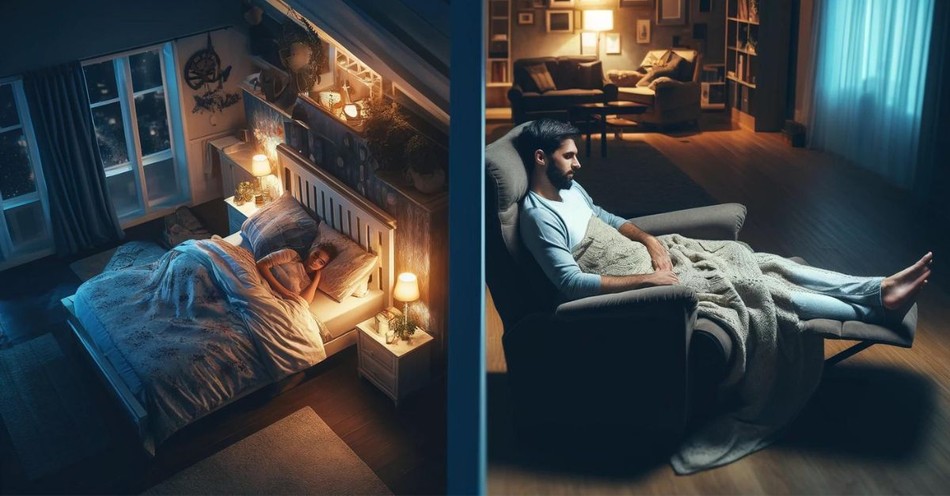Proverbs 3: 24 tells us that “when we lie down our sleep will be sweet.”
But what happens when it isn’t? What happens when your sleep is regularly interrupted by a snoring spouse, your partner’s restless leg syndrome, your husband’s sleep apnea, or your wife’s sleep schedule that is the total opposite of yours?
I have been married for twenty-three years, and though I love sleeping beside my husband, I get so bothered when he inadvertently steals my covers and it wakes me up, or when he can’t sleep so he keeps me awake with his tossing and turning. He likely gets annoyed that I go to bed and wake up super early, interrupting his later sleep schedule. Sometimes, even the person you’ve been lying next to for over two decades makes it hard to let you get that sweet sleep the Bible talks about.
What Is Sleep Divorce?
Sleep Divorce, the decision to sleep in separate bedrooms, according to the American Academy of Sleep Medicine, is used by 1/3 of American couples.
Some of the reasons for sleep divorce include what you’d imagine: snoring, restless leg syndrome, obstructive sleep apnea, sleepwalking, opposing sleeping schedules, or even REM sleep behavior disorder (when you act out vivid dreams as they occur). And because sleep is so important for a person’s health—it impacts your well-being— and poor-quality sleep increases your risk for chronic health problems, so it makes sense why some couples want to separate at night.
I’ll never forget an episode of a TV show I once watched. The husband had to work all night, so he put his wife in a separate bedroom—loaded with her favorite movies, snacks, and fluffy pillows! She spent the night watching movies, resting, and living her best life! You can see the appeal. Of course, the downside of sleep divorce is the risk of decreased connection, intimacy, and friendship and the loss of meaningful exchanges, conversations, and fun that occur while going to bed.
Is Sleep Divorce Biblical?
Well, this is tricky because, in many ancient cultures, there were different bed chambers for men and women. Frankly, couples didn’t sleep like we do in American today. So, we can’t really say if sleeping in separate rooms is biblical. The Bible doesn’t seem to speak to that. But we can use the wisdom of 1 Corinthians 6:12,
“Everything is permissible (allowable and lawful) for me; but not all things are helpful (good for me to do, expedient and profitable when considered with other things).”
A better question might be, Is Sleep Divorce Helpful for My Marriage?
Is Sleep Divorce Helpful for My Marriage?
Dr. Greg Smalley says, “In a world of work deadlines, endless media distractions, and errands to run, finding time to stop and connect with your spouse emotionally and physically can be a challenge. The bedroom is a vital place for that connection to happen. ‘The master bedroom should be a sacred place because of its ability to have that inner life conversation, to be physically intimate and to laugh and be playful.’”
But he goes on, “As long as intimacy takes place within those four walls, not actually sleeping next to each other is not necessarily wrong. When a couple is sleeping, that’s a time there’s a “very low sacred connection opportunity.”
Some things to consider if you and your spouse are talking about sleep divorce.
- Take the term “divorce” out of the conversation altogether and put it on a different emotional shelf. Use a less heightened emotional term like “alternative sleeping arrangements.”
- Consider starting the night in bed together, then when it’s time to sleep, moving to different parts of the house so everyone can get a good night’s rest, rather than retiring to two separate bedrooms early in the evening.
- Consider your children. What will this decision model be for them? Will it be helpful for their future relationships? How will this decision impact their emotions and sense of security? And who will be responsible for the children if they wake up at night needing a parent? It’s important to discuss how this decision will impact the family and even the next generation.
- Will it negatively impact your friendship, intimacy, and connection? If it will, then it’s not a good idea. But some couples say sleeping separately drastically improves their marriage. It’s not necessarily sinful, but is it good, wise, or helpful for your love? You need to be able to answer that question when making this decision honestly.
- Have you prayed about it? Talked to people who know you well? Sought wise counsel?
- Will it help you rest? If there is a loud snorer in the house or an easily disrupted sleeper, this might be a no-brainer for everyone’s sanity.
- How can you be sure to connect in other ways? What plans will you make intentionally for intimacy and friendship?
- Examine your heart and be sober-minded about the why behind this decision. Is this truly about sleep, or are you trying to escape your marriage? If so, a therapist, not a sleep divorce, is a good next step.
- What guardrails can you put in place? If you set up separate bedrooms, what will you do to guard your heart, mind, body, and soul when you are alone so that you don’t avoid attachment with your spouse and start seeking intimacy elsewhere?
- Have you tried other ways to improve your sleep? The National Sleep Foundation recommends 7-9 hours of sleep a night and encourages folks to make sleep a priority. Have you tried sleeping apps, better temperatures, eating healthy, exercise, essential oils, good pillows, healthy sleep habits like going to bed on time and avoiding blue lights from screens? You might find that simple habits of sleep hygiene deliver the change you need.
- What does your spouse think? What does your spouse want? Hebrews 13:4 tells us to hold marriage in honor. 1 Corinthians 13 tells us that love is patient and kind and does not insist on its own way. Consider your spouse’s needs as important as your own in this decision.
Whatever you decide, make sure it is the healthiest one possible for your marriage and your future with your spouse. And remember, research still says that a massive number (86 %) of couples who sleep together are happier in their relationships. They might have something to teach us.
Photo Credit: Image created using DALL.E 2024 AI technology and subsequently edited and reviewed by our editorial team.


_638919941832670018.jpg)

%20(5).jpg)
